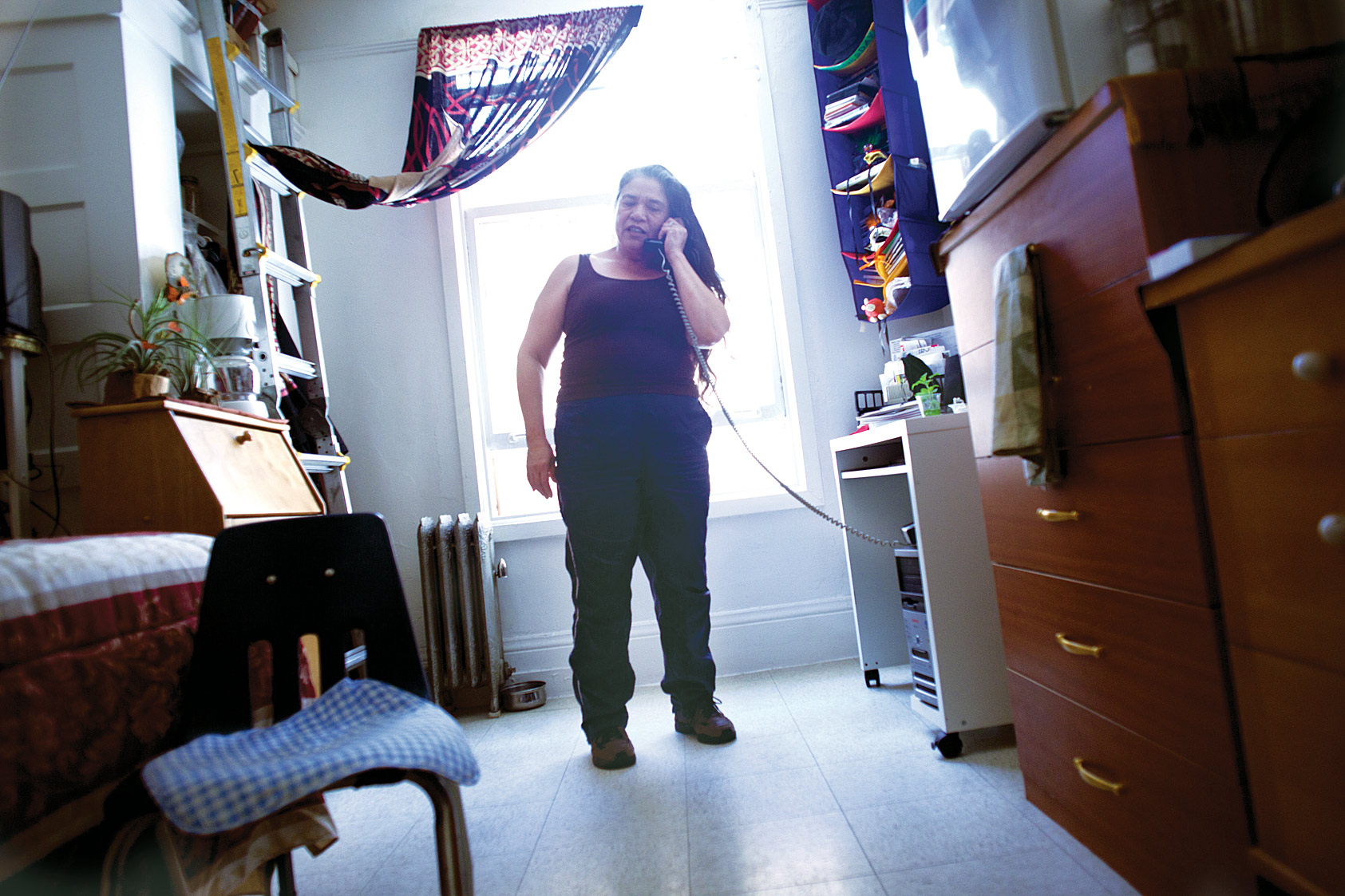A proposal by state utilities regulators to deregulate basic phone service could open competition to companies using newer technologies, but critics say it could sharply increase costs for more than 2 million low-income Californians who rely on discounted landline service.
All landline rates could rise under the proposed rules, which would increase the companies’ leeway in new charges for services, whose prices are now fixed. Phone rates have been under California Public Utilities Commission oversight since the dawn of phone service in 1915.
The commission, which regulates the state’s telecommunication, energy, water and transportation industries, has proposed ending a requirement that basic phone service include free incoming calls and unlimited local calling for a flat rate. Both elements are among the minimum standards of phone service established in the 1984 Moore Universal Telephone Act aimed at keeping phone service affordable and efficient for all state residents.
Under the CPUC proposal, telecommunication companies would not have to offer these features to receive state subsidies. The commission’s goal is to have cellular companies bid to be the subsidized service provider for these customers. Currently, cellular service does not meet the state’s basic service requirements, effectively eliminating the technology from subsidies. Before officially redefining basic phone service, the commission would hold public workshops and a formal hearing. No schedule has been set.
Consumer groups adamantly oppose the proposal, saying it favors the telecommunication companies.
The debate is part of a larger battle pitting those favoring a free market against regulation proponents, and it is an expensive game. AT&T and Verizon, which control 65 percent of all residential landline, wireless and broadband connections in California (and 85 percent of dedicated landlines), have spent $55 million since 2001 lobbying to sway state officials toward a free-market approach.
In 2006, the CPUC declared “that competitive market forces will assure that rate levels are just and reasonable,” and allowed telecommunication companies to raise nearly all rates at will. Some charges have gone up several hundred percent since 2006. The commission still requires a 30-day notice on basic residential service rate changes, but that price cap is scheduled to come off on Jan. 1.
Some officials oppose the rush to deregulation. On July 16, the state Senate Office of Oversight and Outcomes released a report criticizing the CPUC for scant oversight of the telecommunication industry and for ignoring consumer complaints, sometimes deleting thousands of cases at a time without resolution. The report stated that “no one knows what will happen” to California LifeLine rates, which are pegged at half the price of basic phone service. The rates will directly affect people like LifeLine customer Catalina Dean, 58, of San Francisco, who is thrilled she can afford phone service so she can talk to her family more often. She isn’t sure she will be able to afford it if her bill increases steeply.
PAYING MORE FOR LESS?
Basic phone service requirements would be weakened by the CPUC proposal and would open the possibility of much higher bills, opponents of the plan say. Consumer advocacy groups such as Disability Rights Advocates, The Utility Reform Network and the National Consumer Law Center jointly argued in a brief to the commission that no one “has provided any reason why metering all incoming and outgoing calls is in the public interest.”
The groups also asked why no analysis had been made of the supposed windfall the proposal would create for the telecommunication companies charging both callers and receivers for local, long-distance and wireless calls, as well as for calls exceeding a prescribed number of minutes. The CPUC’s stated aim is to be “technologically neutral” in terms of service standards for mobile and landline phones and to “take advantage of market forces” by having companies bid to provide service for high-cost areas and low-income households.
Consumer advocates disagree with the method the CPUC would use to be technologically neutral. Rather than increasing the service standards necessary for mobile service to receive subsidies, the commission wants to weaken basic service requirements for landlines, said Regina Costa, TURN’s telecommunications director. Costa said the proposal would turn “landline service into cellular service. Wireless doesn’t have to improve service at all to receive subsidies.” The lone beneficiaries of the commission’s plan, she said, would be AT&T and Verizon.
TELECOM TITANS APPLAUD
California’s two largest telecommunication companies have applauded the commission’s decision to rewrite service requirements. Although the proposal would eliminate the requirement that free incoming calls and unlimited local calling be part of basic residential service, it does state that customers should have the option to receive a “reasonable allowance” of phone use without incurring per-minute charges. What constitutes “reasonable” is up for debate.
The Commission must resist the idea that it needs to tell carriers they have to offer an allowance of a certain number of minutes,” AT&T argued in suggestions submitted to the commission. The company said defining a quantity is “too subjective” and that allowing companies to decide how many minutes are reasonable is what “competitive providers use to differentiate themselves.” Verizon agreed. “Any attempt by regulators to prescribe a pricing structure in a competitive market is unnecessary and counterproductive,” the company stated in an argument to the commission. “This should be left instead to the market.”
Companies bidding to provide cellular service to low-income households and high-cost areas raises service-quality issues. The CPUC is unsure how to measure service quality other than the ability to send and receive calls from residences and the avoidance of dropped calls. Verizon and AT&T say measuring quality is unnecessary. Verizon said the commission “should make clear that oversight of such carriers will be limited.” Certifying quality would be “difficult if not impossible” and impracticable, Verizon said.
AT&T urged that the commission “not impose any service requirements.”
CONTINUING FOUR YEARS OF DEREGULATION
In 2006, the CPUC issued the Uniform Regulatory Framework decision allowing telecom companies to raise rates with only a day’s prior notice to the commission, and staff was told to treat the notice letters in a purely “ministerial” manner and approve the rates.
The next year, the commission scrapped the notice requirement, mandating only that AT&T and Verizon maintain “a link to the carrier’s page for accessing” rates, the oversight office’s report stated.
The basic residential and the subsidized LifeLine rate hikes have been phased in during the past two years. Coupled with the overhaul of the basic service standards, the two decisions will “destroy phone service we’ve had for nearly 100 years,” said Costa. While the Senate oversight office said “no one knows what will happen” to LifeLine rates when price controls expire, the CPUC’s Division of Ratepayer Advocates said prices are likely to rise.
In a 2008 report, the office said rates have “skyrocketed” since the 2006 decision to uncap prices, “which strongly suggests that basic residential rates will also increase as the price controls are lifted.” The report concluded that the 2006 decision was a failure, stating that “market forces have not led to stable or reduced prices.”
Since deregulation, very few AT&T, Verizon, SureWest or Frontier rates have dropped and most have increased, some by several hundred percent, according to the report. AT&T, for example, has raised the surcharge for keeping a number unlisted by 614 percent.
In 2007, the CPUC decided that price increases are “not subject to protest on the grounds that the rates are unjust, unreasonable or discriminatory.” But the Senate oversight office did just that: It disputed the reasonableness of the charges and asked if the commission had an interest in the matter.
Jack Leutza, director of the CPUC’s telecommunications division, said the commission still monitors rates. “There isn’t a reporting requirement,” he wrote in an e-mail ro the Senate oversight office. “But we do sometimes discuss info we find publicly available with AT&T.”
CPUC president Michael Peevey wrote in a memo that rate hikes were to be expected “in a transitioning period until market equilibrium is reached.” He added that while individual prices have increased, customers could save money by buying bundled services, meaning multiple services such as phone, high-speed Internet and television cable combined into a single rate package.
The Division of Ratepayer Advocates countered that such savings don’t exist for customers who cannot afford multiple services.
The commission believes the market allows customers to “vote with their feet,” leaving expensive phone carriers for competitors.
Costa said the decisions to deregulate and to redefine basic phone service are “purely ideological” on the part of the CPUC, which operates under “the notion that there is competition” while a 2008 analysis by the commission’s own communications division described AT&T’s and Verizon’s control of landlines, wireless and broadband connections in the state as “oligopolistic.”
CONSUMER COMPLAINTS IGNORED
In 2006, the commission asked the state Legislature for an additional $12.7 million for fiscal 2006-07 to protect consumers from fraud and abuse in the telecommunication market. The funds reportedly didn’t achieve their stated purpose. The Senate oversight office’s report found that the commission’s Consumer Affairs Branch focused on closing rather than resolving cases. More than 2,700 unresolved cases of customers who sought Consumer Affairs help regarding utility bills and services were closed in a single day in September 2006. That year, 21,000 cases were scrapped unresolved.
Paul Clanon, CPUC director of consumer affairs, told the Senate Rules Committee in 2007 that discarding cases en bloc was “regrettable but necessary.” The oversight office found also that Consumer Affairs frequently directed Californians with cell phone billing problems to the Federal Communications Commission, though everything on a customer’s bill is under CPUC jurisdiction.
Each year, Consumer Affairs receives about 100,000 complaints, two-thirds of them about telecommunications. Since 2004, only eight formal proceedings into the complaints have been initiated.
LOW-INCOME SERVICE HANGS IN THE BALANCE
While the new definition of phone service could boost telecommunication company profits, it could strike hard at households with few phone service options. Dean pays $6.84 a month for unlimited local calls, plus a $10 installation fee that she paid in three installments. A former tow-truck driver, she has liver problems and lives off disability in a single-room occupancy hotel in San Francisco.
With LifeLine, she can easily talk with her two daughters and arrange doctor appointments, and she called LifeLine a “lifesaver” in emergencies and “a miracle living off such a short amount of money.”
Dean doesn’t like metered calling.
“It’s not really anything we can depend on that we can write down when we sit there and do the budget,” she said. She worries that she’ll lose the phone service if prices rise much more. Her two biggest fears are losing contact with her family and with the 911 emergency line.










